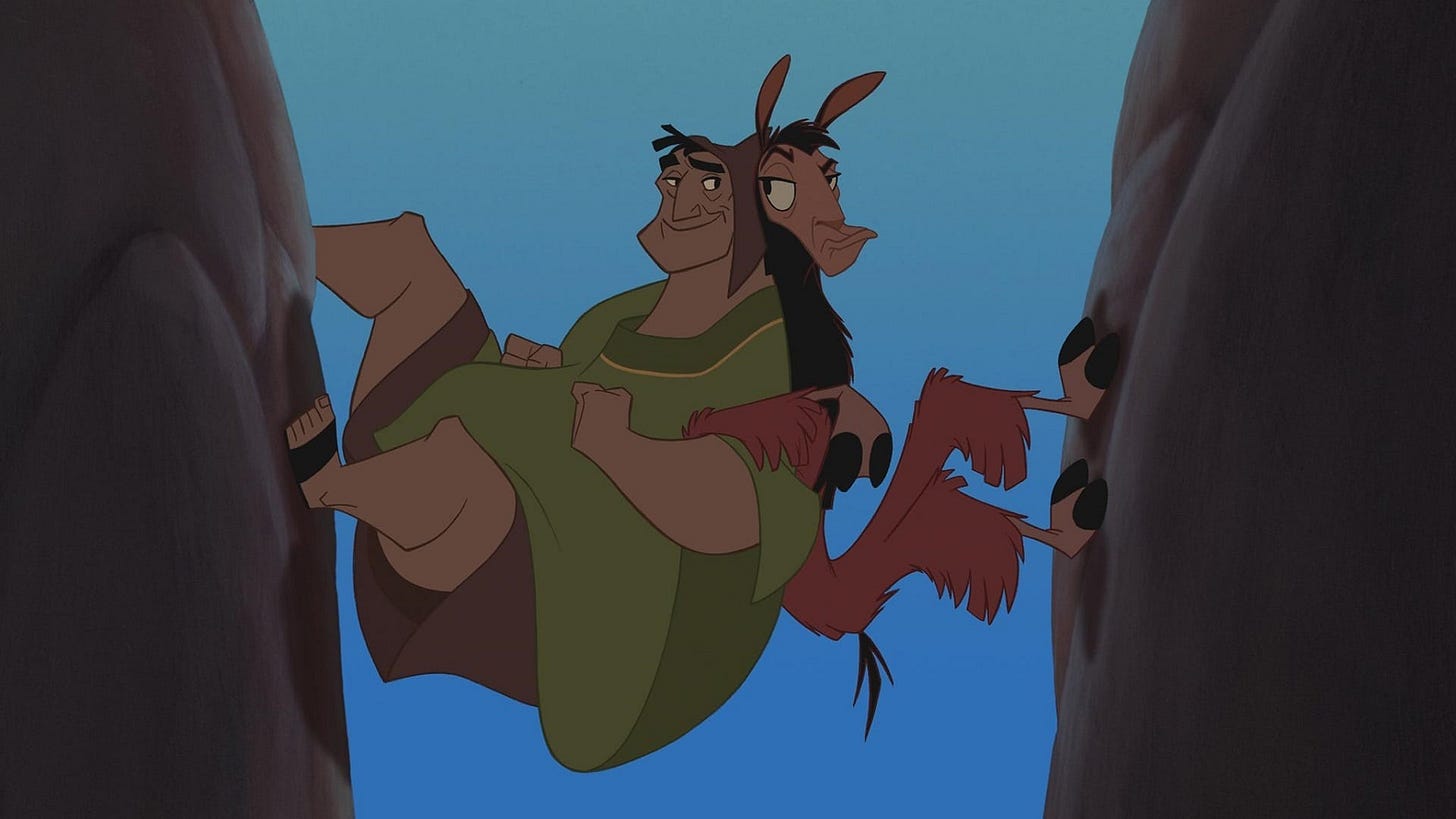The Emperor's New Groove
Chaotic good
There’s a universe, pretty close to this one, where The Emperor’s New Groove (2000) never existed. Disney had originally planned a serious animated epic, a Prince of Egypt-style project called Kingdom of the Sun with Sting writing the music. The final film, of course, is not that. It couldn’t be further from that. Somewhere in the chaos of creative implosion, executive panic, and dumb luck, the movie mutated into the strangest Disney feature of its era: a buddy comedy about a spoiled emperor turned llama, a kindhearted peasant, and a villainess (voiced magnificently by Eartha Kitt) who is basically a Looney Tune. It’s less “Disney Renaissance” and more Saturday morning cartoon, but like a plot in a Saturday morning cartoon it inexplicably comes together.
Kuzco (David Spade), a narcissistic young emperor, opens the movie by breaking the fourth wall to introduce himself as both narrator and subject. This alone sets the tone: self-aware, petty, unwilling to follow the typical fairytale blueprint. His foil is Pacha (John Goodman), a humble villager whose hilltop home becomes the unintended target of Kuzco’s plan to build his birthday palace. The plot only kicks in after Yzma (Eartha Kitt), the film’s true MVP, accidentally transforms Kuzco into a llama with the help of her lovable idiot sidekick (sidepiece?) Kronk (Patrick Warburton). What follows is a road trip movie in which llama-Kuzco must learn a little humility, Pacha proves decency is not weakness, and Kronk steals every scene with his culinary prowess.
Visually, it’s a departure. Gone is the grandeur of The Lion King or the painterly beauty of Pocahontas. Instead, the animators lean into rubbery expressions, slapstick timing, and irreverence. Characters don’t just acknowledge the audience: they argue with the narrator, redraw the map they’re traveling on, and bend the “rules” of the film’s own reality. It feels anarchic in a way Disney almost never does.
What makes The Emperor’s New Groove endure is how it never pretends to be more than a comedy. There’s no real love story, no sweeping ballads (sorry Sting), no grandiose moral; just a lean 78 minutes of gags and unlikely friendship. And yet, tucked into the laughter is a genuine warmth. Kuzco changes not because the story demands it, but because Pacha’s kindness is relentless enough to cut through his llama-sized ego. This may be David Spade’s finest performance.
Despite not pretending at more than a comedy, one could zoom out enough to see the morality play at work here: someone with money and power, taking from someone without it. That person with the power is so ignorant of their responsibility that they become a target. While there is no direct acknowledgement or resolution of these dynamics, having them subtly drive the plot and inform the reality of the characters is refreshing. In the back of some viewers’ minds, power dynamics are being considered, and principles or beliefs are forming.
Twenty-five years later, the film has outlived its chaotic production history. It’s a cult favorite, beloved by kids who grew up quoting Kronk’s shoulder angel or Yzma’s “WRONG LEVER!” scream. It’s a rare example of a studio film that stumbles into something timeless.
We’ve been writing about animated films all month, with the exception of Dae’s great post. To be fair, I forgot to tell Dae I had a theme in mind for the month. Whoops. We’ve all got a lot going on, but now August ‘25 will be the funniest month, likely only to me, because it has four ‘cartoons’ and The English Patient (1996). Which of these five films deserves the highest praise? We’ll let you be the judge. But the reason I mention animated films is that they’re becoming more of a lost art in American film. The Emperor’s New Groove is proof that a movie doesn’t have to be the next Princess Mononoke (1997) to warrant the greenlight. It’s a medium that allows for creative storytelling of the highest caliber: engaging for all ages, inspiring for the young, subversive for the old. This movie is a summer delight; an example of animation not at its finest, but at its best.
The Emperor’s New Groove
Written by David Reynolds; Directed by Mark Dindal
2000
78 minutes
English
Recommended way to watch (at time of publication): Streaming on Disney+
You’ll like this if you like: Shrek (2001), Looney Tunes: Back in Action (2003), Road to El Dorado (2000)

